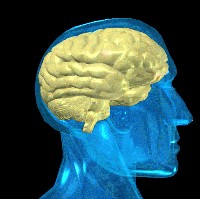Eli Lilly and Company in Indianapolis says the U.S. Food and Drug Administration on Friday approved Amyvid, a radioactive diagnostic agent made by its subsidiary Avid Radiopharmaceuticals. Amyvid is designed to work with Positron Emission Tomography (PET) scans to reveal beta-amyloid plaques in patients with suspected cognitive impairment disorders such as Alzheimer’s disease.
Amyvid is tagged with a radioisotope called fluorine-18 and injected into the patient. Once in the vein, Amyvid travels through the blood stream and into the brain, binding to amyloid plaques. Amyvid produces a positron signal, which is detected by a PET scanner and used to create a brain image. A radiologist trained in the technology interprets the image for the presence or absence of significant — defined as moderate to frequent levels — of neuritic plaques in the brain. The referring physician can then determine the next steps in the evaluation and management of the patient.
The company notes that Amyvid should be used with other diagnostic tools to determine the presence of Alzheimer’s disease or other cognitive disorders, since a positive Amyvid scan by itself does not establish a diagnosis of the disease. A definitive diagnosis of Alzheimer’s disease usually requires an autopsy, thus physicians rely on a variety of diagnostic tools such as medical history and clinical examination when evaluating patients.
FDA asked Avid to develop a training program for radiologists to ensure accuracy and consistency of interpretations of Amyvid scans. Lilly says both online and in-person courses have been developed for this purpose. Nonetheless, Lilly still warns that errors may occur in the estimation of plaque density during the interpretation of Amyvid images.
Lilly also cautions that the safety and effectiveness of Amyvid have not been established for predicting development of dementia or other neurologic condition, nor in monitoring responses to therapies. In clinical trials, the most common adverse reactions, each reported in 1.8 percent of the patients or less, were headache, musculoskeletal pain, fatigue, nausea, anxiety, back pain, increased blood pressure, claustrophobia, feeling cold, insomnia, and neck pain.
The company says Amyvid loses over half of its radioactivity every two hours, thus it must be distributed directly from a radiopharmacy to the imaging centers, where it will be administered within several hours. A limited number of radiopharmacies are expected to begin distributing Amyvid beginning in June 2012.
Read more: Bristol-Myers Squibb, Biotech Partner on Alzheimer’s Test
* * *


 RSS - Posts
RSS - Posts
[…] FDA Approves Brain Imaging Agent for Alzheimer’s Diagnosis […]
[…] FDA Approves Brain Imaging Agent for Alzheimer’s Diagnosis […]